Of course I am into the wine now. White wine, humid summer air hanging down gravely upon my skin, I am doing nothing at all. I stare outward from the porch with sleepy eyes — the street wears a sepia hue, or a nicotine-yellow filter; a filter of somber fatalism of a nearly tropical variety. Though I am not watching the rusting barques arrive at the port of Lisboa, I might as well be — I see the dented old Ford Econolines swerving along by the strip mall on the boulevard; the speeding automobiles with cigarette-smoking occupants staring forward just as vacantly as I am. No, I am not in Lisbon, I am not a widower-cum-fado singer who has retired into a state of Brazilian melancholy — I am simply one of Uncle Sam’s “lost boys,” lolling back my eyes with a sense of vague grief as I sup at my Vinho Verde. As I do, I wonder why it is that I have never fit into my country and yet, somehow, I might be the most American man in the world nonetheless.
It is a case of añoranza — a kind of deep, yearnful longing for some unknown or perhaps unknowable thing.
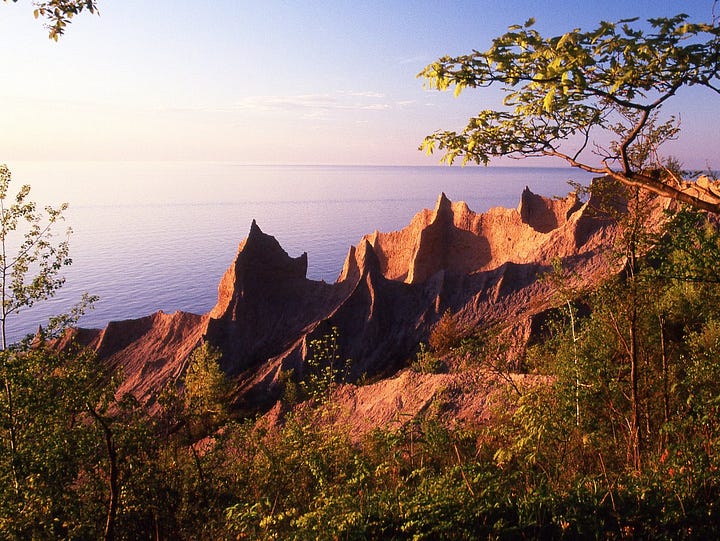

Perhaps it is only the case that I am the “final American.” Like Nietzsche’s “Last Man” I have been forced to face the end — to stare directly at the hemorrhaging of my world and the draining of all its poetry and vigor. Were it to be that I was a more dignified and stoical sort of fellow, why, this burden would only be a private one — but I am not; I am quite frankly taken with the hysterics and the melodrama and drum them up in big public displays. I weep for my country so much that the weeping ceases, and after so long, instead of producing a single tear, I stare forward in a kind of cynical wonderment, dazzled by the ugliness wrought upon the once-shining skin of my beloved patria.
Uncorking and sipping and idling as I am, I weigh the situation and examine its gravity with a sense of tragic detachment from all fate; I wear the heaviness of my miles and my years not as a prize but as a pointless punishment. Yes, I have seen the country. Yes, I know what I have seen. Yes, I have sworn an oath for this country — donning a uniform, saluting the Spangled Banner as I strutted across the brow of a tired old ship. My haircut was tight and my manner of speech was crisp then, but before, of course, I was a bearded sluggard, a vagrant, a malcontent. Like an American Siddartha, I traveled from low to high; once a respect-starved vagabond and, later, a military sailor who gorged on respect. I went from dumpster-diving my dinner to rolling up to restaurants in my BMW, from under overpasses to the high halls of Hilton hotels — I searched this country up and down and I know exactly what it was that I found.
It was nothing to celebrate, not really. This is harsh, this is a message that does not sell — nobody wants to hear it. But it was like this: Imagine meeting an esteemed family with an old and venerable name, but finding every one of their children to be wastrels and degenerates who spit in the face of their patriarchs and laugh. In your stay at the family estate, the only compelling personages were the geriatrics; the only riveting stories were those scraped up from the depths of the depths of ancient memory. The house is either stifling hot or it is fearsome with icy drafts — the food is ravaged by vermin and the children are illiterate. Yet everywhere, the family crest is displayed; the family name uttered with a sense of extreme reverence bordering on the comical and absurd, and it is comical because the state of the house is so abundantly deplorable.

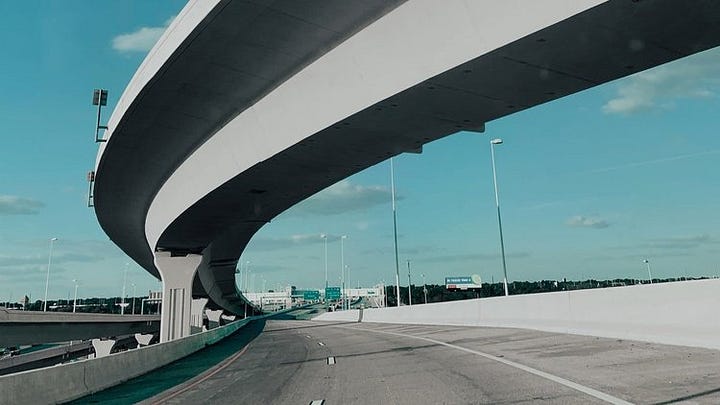
Yes — if America were the estate of a single old family, perhaps it would be something like this. For of course, there are corners of it where its beauty is immutable and serious and of a timeless sort of character, like any truly great estate; there are a few old faces, too, who remember whatever it was that gave the family its regal name — but when leaving-time comes, you think to yourself “thank God” and make haste to depart.
Of course then an awful discovery is then made. You realize that you are a member of this family, and in fact, that you exemplify their traits so aptly they wish to make you into some sort of baron. They can offer you the marble-columned guesthouse as your stead, and rush to do so — but it is a stinking, crumbling place, without bedding or chairs or so much as a single alluring quality except the view out the window. Now you are its inmate; you find an old board of wood to sit on and station yourself by that window, and as you sit and gaze at the genuinely delightful view, you can only study the history of the estate and continue to repeat the family name as if it were your Alpha and Omega. But, each day, you must venture out into the rest of the squalid, distressed estate and it is there that you remember the carceral nature of your tenure there. It is there that the raw and unfiltered degeneration is so garishly on display, and all the ways in which you have been blessed admix with a bizarre and darkening sense of despair — for you are powerless to fix the endless problems of this dying family.
But enough with metaphors — I suspect you get the picture by now. I am, let it be said squarely and plainly right from the start, just the sort of man who might seriously have been born to ramble. A natural émigré; a soul not merely born into exile but conceived into it — all my life I have pined for the steamer ship and the trunk and the foreign port and the tersely-worded letter home. Perhaps this would have been true for me even if I had been born into the very highest spires of the historical American Empire; even if I were a high-born St Louisian presiding over the gilded buttresses of the World’s Fair I still would’ve ventured away, if only because it is in my nature to depart.
And so it is that I am ill-suited to going on long patriotic diatribes, except as a vague kind of exercise or as a way to put bread on the table. Just as Anais Nin and Henry Miller wrote erotica to support their actual novel-writing habits — perhaps I could make the same sort of career out of re-hashing nationalistic themes for the sake of getting the crowds fired up. Heaven knows I would be good at this, but just the same, it is a pursuit that is really every bit as low as erotica-writing ever was — perhaps it is even actually worse, because at least it can be presumed that the erotica-writer does occasionally enjoy having sex. As for me, I find the vast majority of this country’s shape in the present-day era to be flatly repulsive (I take no joy in admitting this) and at day’s end, I am always relieved to hear anyone speaking French along the northern border, or to hear the musical tones of español down by Mexico. When I hear these foreign melodies, I am reminded that the world is bigger than the country into which I was born, and in this I take heart immensely.
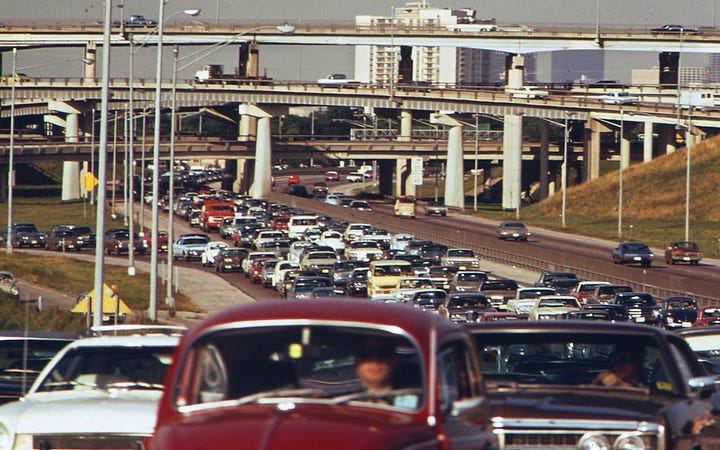
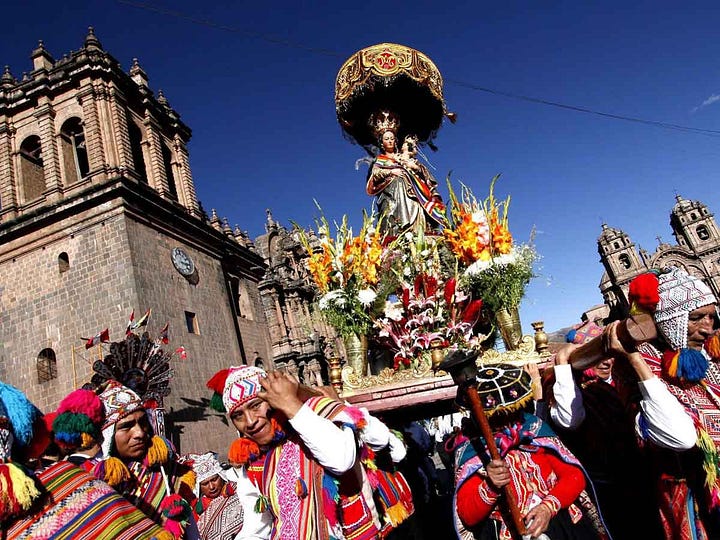
Now you know that I am being dramatic — because it is not really as simple as the above paragraph might lead you to imagine. To the contrary, I am actually of two minds about America, and those who have read my work for a long time can probably tell quite clearly that this is how I feel. Because in lieu of having a country that, for the first, even sees itself as a coherent “country” to begin with, and for the second, is a country that thrives with a citizenry who raises their heads with unequivocal dignity and great power — all I have been reduced to is the pursuit of searching for the few still-warm embers of what the country was or could have been and holding them in my hands. When I succeed in doing that, I always find myself giddy with delight. Because it is true: The United States of America was, and still very occasionally remains a completely stunning, magnificent kind of country — a place that sends my spirit soaring to the highest heights, and in a sense, it is my greatest lover.
Those heights, of course, are hazardous — like any high precipice or vista. One can fall down so easily, and without fail, every time that I rise to such heights, I am almost immediately after exposed to the banal ugliness of what we have done and I die again; my ‘American spirit’ is cajoled out of me as the traffic rages by and the endless concrete strip malls shimmer with lifeless and unpeopled heat. All I smell is the stupid Burger King — you know they pipe ‘burger smoke’ out of those places, as if they are always running some kind of sordid, meaty conclave in there — and the exhaust of the cars. I behold this all as the ultimate betrayal; I simmer and boil with black hatred for what has been done now in the name of convenience and a sham caricature of “freedom,” and as I stew and murmur and curse, my countrymen look as me as if I were a certifiable schizophrenic. They seem comprehend it at all; it is as if we are a different species, though we have the same passport.
And so it is that I have gone and seen as much of my country as I conceivably could — far more of it than the vast majority of my fellow citizens have ever seen or ever will see — only to be regarded with a kind of contempt by the patriots. Those who call me a ‘communist’ or a ‘faggot’ or tell me to ‘move to Europe’ do not seem to detect that I am on their side, and always was. Yet now I sip my wine and cut myself adrift, for I feel I can fight no more; some kind of fatal exhaustion has crept up into me, and a most unfortunate kind of disgust or cynicism has left me jaded. I stare at the map on the wall — Argentina, Bolivia, Azores, El Salvador, Oman, et cetera et cetera — and find a kind of comfort (maybe it is really a perverse comfort) in knowing that the world is so much larger than these United States.
In truth, these dark ruminations may now really be the wages of a truly idyllic childhood. For again, I know what it was that I saw in my youth — it was all distinctly real, and I can confirm it time and again when speaking to my elders, who lived it and watched it just the same as I did. It was a Norman Rockwell painting, or, really it was something even more exhilarating and primordial; it was a time where, yes, NAFTA and oil crises and wars and recessions and so on had taken their toll, in quite the same way as all the rest of the Rust Belt — but there was something else, something underneath the bruises left by the bad policies, depressed economics, and high rates of outmigration.
That living thing beneath the ruin and decay was an organism — our culture, our family, our life; it was not a machine, it was not yet ossified into a series of transactions or bureaucratic negotiations. We lived and we breathed as human beings then and there was no internet and no cellular service; the porches were occupied and the yard parties were constant. The humid heat shimmered high above the June-time leaves and flowers and gardens and neighbors greeted one another. Old-time friends and socials; dances, even, and meetings and barbeques. The automobiles were easy to fix, and cheap to boot — the radio played polka songs on Sundays and at Easter, Pączki came in white boxes to the kitchen tables. These are not the reflections of a nonagenarian, nor are they sham images generated by aimless and irresponsible romanticism — they are the historical and biographical facts of my own life, as told by me now, at the young age of thirty-one.
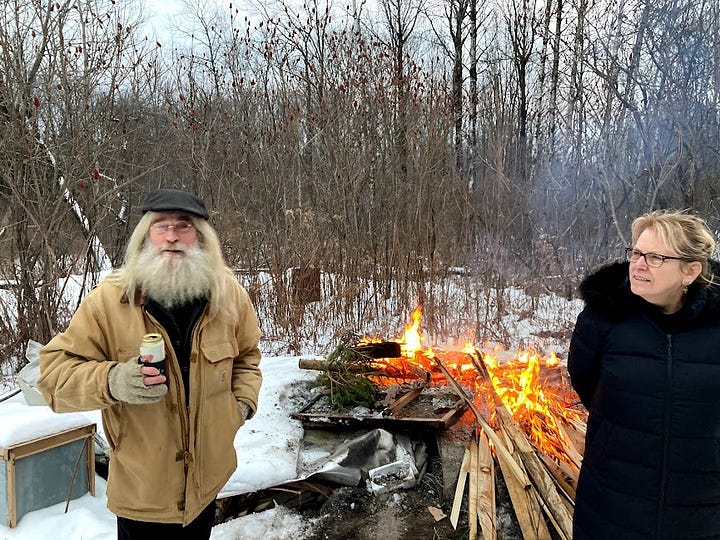
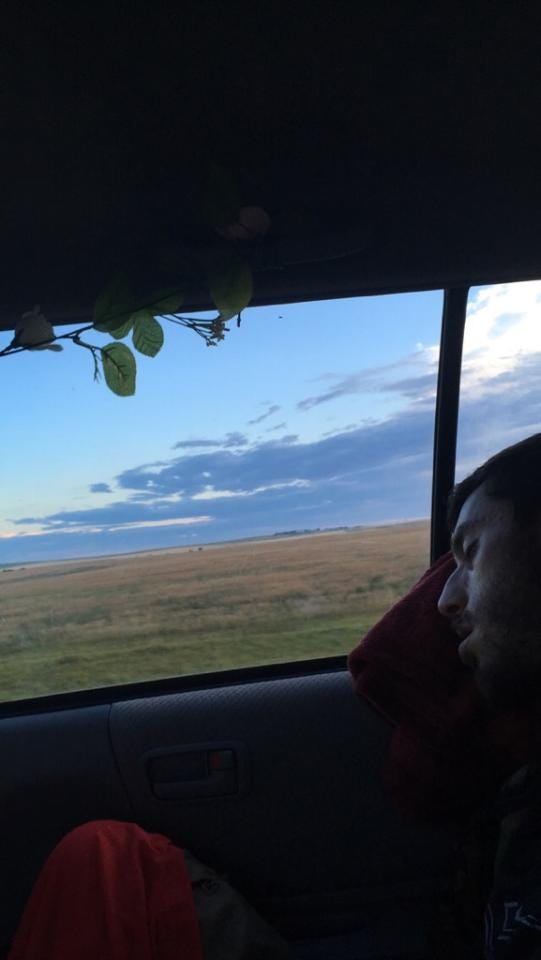
In just twenty years that ‘organism’ has died a wretched and torturous death. Ember after ember of those days has been extinguished by the forces of a barbarous “progress” — Obituaries have followed obituaries, and countless families have moved to Florida. No one remembers now, or if they do, they only finger through those memories in their minds as the televisions blare and the porch sits emptier than ever. I cannot afford to buy a home in my home town anymore, either; and if I could, I would be pissing up a long rope to ever hope to mend things or fix them. Like an exile from the squalid, rusted backwaters of some far-flung province of Moldova or Poland or Russia — this may seem to be a dramatic analogy but by all I know it is distressingly apt — I have held my beloved home in my hands and watched it disintegrate. Now, there is no dreaming left to do; there is nothing left to witness except the bloody coup de grâce.
It is either this — or there is departure. And the taste of departure floods me with wonderment; it comes as a sane and healthful tonic and yet, beneath these gladdening notes it smacks just the same of betrayal and rootlessness and retreat. Yet I drink of it nonetheless, and on that score, that is where the wine comes in: the ‘terroir’ is a kind of travel — to taste the fruits of the vine from all corners of the globe as I meditate on these grave matters is really to taste a little of a foreign land; a land where things might not be so frosted with despondency… lands where all the vigor and sunlight of my old, dead village might become knowable to me again.
Cab Franc from the Uco Valley of Mendoza tells me a story of Argentina and beckons me… “che, boludo, che!…” and then I am onto the Albariños of Spain, meditating upon those hot, arid uplands where the Oratorios cut skyward over the vineyards. Sicilian Lambrusco and Chilean Malbec; the Rhône and the Riebeek valleys — I am drinking the whole world from the porch of my crumbling homeland, and as I read every label, I really do dream of absconding, forever.
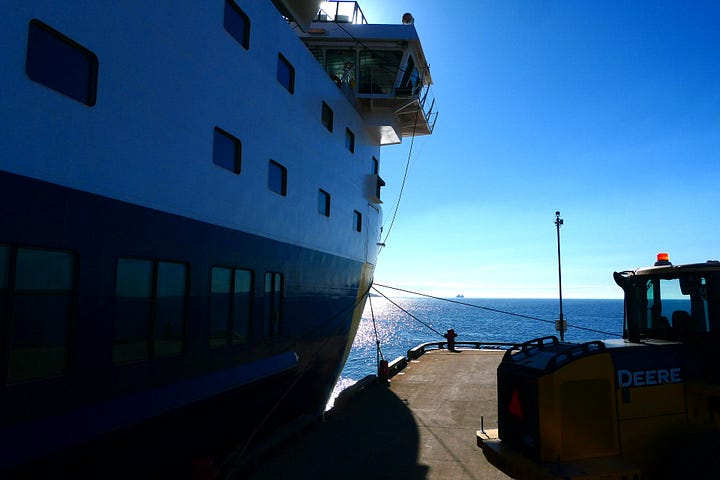
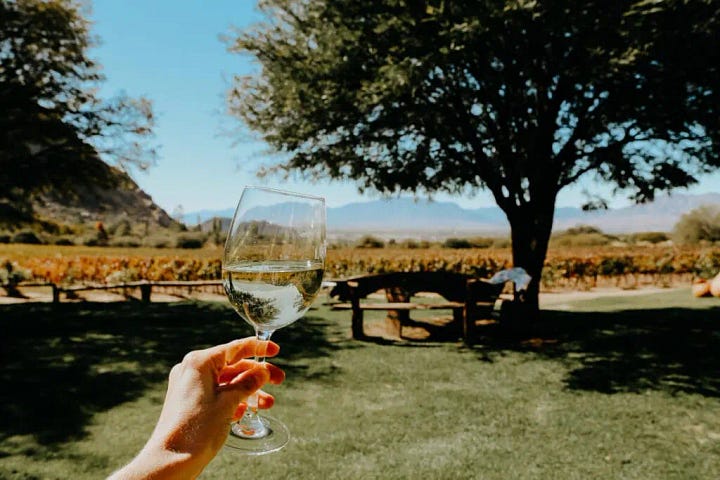
Whether I will is another question, of course. For in so many ways, the Land of the Free is quite like the “Hotel California” — one seems somehow to possess every freedom but the freedom to take leave of the country itself. A thing with momentum is not easily stopped; three decades in this place and I have scarcely left yet — and this is in spite of continuously traveling for over ten years. More than this, I am from the country that everyone on earth wishes to come to. I am from the great originator of the global project of cultural homogenization — the highest King of commercialism and automobiling; the land of the coveted Blue Jeans and Justin Bieber songs and Coca-Cola.
How could it be that as I stare at the doom that hangs over this place, there are now, as I write this, families clutching their belongings in heinous deserts at a hot sprint northward for a chance at this American Dream? Are they ignorant of the problems here? Or do they bring with them a similar ‘organism’ of family and faith and culture to that of my old village — ‘organism’ that it seems my country’s great “progress” actually murdered? It could be that these migrants will come, station themselves here to enjoy the great fruits of wealth, retaining their dances and songs and closeness and custom — only to realize, all too late, that “America” is now a kind of machine whose accidental purpose is to kill that culture. The “melting pot” is now, it seems, a furiously speeding centrifuge; the uneven and organic ‘chunks’ of old cultures are no longer visible or swimming in the soup — now the centrifuge melts all together on a molecular level, spitting out the ultimate global monoculture as it whirs and whizzes… and at the end of it, the migrant’s grandchildren are unrecognizable or even lost.
But what might be read as a warning to the poor immigrant is, to the rich Gringo — a kind of eulogy. Of course, it is an unreadable eulogy; a thing choked with such grief and madness that a patriot must avert their eyes or slink into an impossible abyss of doubts. Or, if they have the courage to look at it, what will they do? The idea of “fixing it” feels so long-gone to me now; perhaps it is not so far gone elsewhere as it is in my home town… these are unanswerable questions.
I ponder it all as I sip. Beside me, my wife sleeps with our baby growing and kicking and sleeping and readying himself (or herself) to emerge into the world. What kind of a world will we give this child? All I can give now is a front-row seat to the terminal decline; a slice of extreme liminality and isolation. I am not rich enough to live in the few vibrant places left in America — our Manhattans and Chicagos and Vermonts may as well be a foreign country to which I have not been invited and could never afford. This provincial life of ours comes just a generation or two too late — if the “Empire State” is an empire, it is doddering and wheezing; it is Spengler’s collapsing empire… a place in which a young person will find nothing.
It may be that if we raise our baby here, they will grow to emigrate anyway — and then, what will my loyalty to this place have been for?
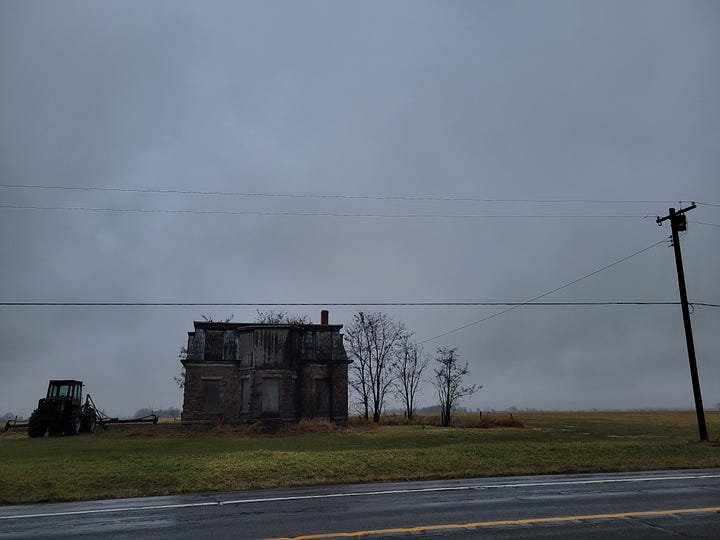
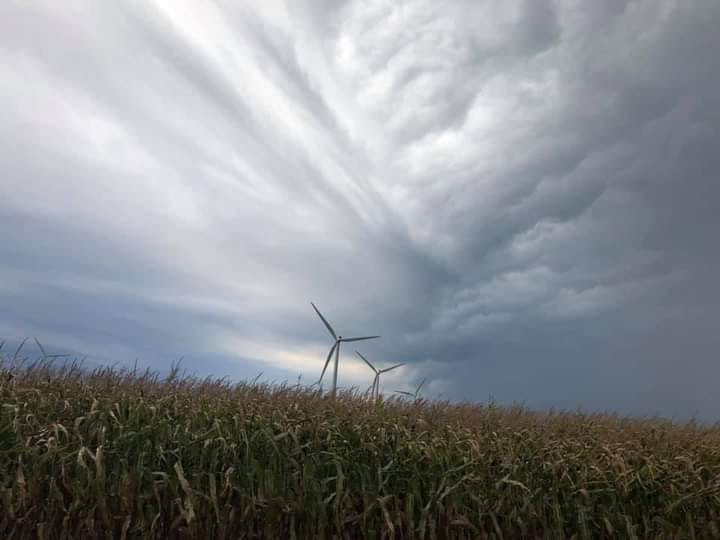
There are no answers, not yet. There is only wine and the resplendent leaves of the beeches wavering through the thick and broiling air; there is a label saying “HECHO EN ARGENTINA” below a printed map of Mendoza. Visions of Coahuila and Sardinia; half-baked thoughts of sailboats or of becoming a microbusero on the carreterra austral. Dreams of Greenland and the Falklands, or of estancias and asadas in Jujuy… Azeri odysseys, the sharp springs of Siberian motel beds, dribbling palmwine drunkards lurching about on Micronesian islands…
Now, I plunge either into the depths of pure written fantasy at my lonesome estate — or I make ready for a voyage to end all voyages. It might really be a kind of desperate and pointless melodrama; I cannot say. Perhaps things are not as bad as I have seen after so many years along the American highway. Or perhaps, if they are bad, they are only bad for me. It could be that what the critics say is true — that I am the sort of man who only pines for heaven, and that indeed, I would be happy nowhere on earth. If that is the case, may Christ be with me; and may the journey lead me to Sainthood by any means that Providence should allow. Whether my exile be internal or a real, genuine kind of exile, let me find my homeland in Christ Jesus as I find Him in the Blessed Sacrament… and after Mass, let me sip upon my wine and stare once again at the map of the good earth.
I believe that it is, in the end, a thing the Brazilians call “saudade.” Wikipedia defines it this way:
…an emotional state of melancholic or profoundly nostalgic longing for a beloved yet absent someone or something. It derives from the Latin word for solitude. It is often associated with a repressed understanding that one might never encounter the object of longing ever again. It is a recollection of feelings, experiences, places, or events, often elusive, that cause a sense of separation from the exciting, pleasant, or joyous sensations they once caused.
The term is completely apt because it describes a kind of mixed feeling; a kind of lost joy that is remembered so fondly and mourned in the same breath. It is a kind of contradiction in which the soul lives and resides and breathes — and Brazil is, apparently, the kind of country where a human heart can park their saudade comfortably enough.
Is America such a country, too?
Staring out at the speeding cars on the boulevard, I find no answer.




No country, nor person, quite lives up to its promise, especially if that promise has qualities which rightly could be considered high and noble. "We hold these truths to be self evident..." "Imitate me as I imitate Christ."
Sometimes it is best that we not lift our gaze too much higher than our own fence line. There is plenty enough to keep us occupied within that view. Build something. Build a family. Build a place. Perhaps with a few like-minded souls, build a community. Not a bad life, in view of eternity. Eternity... that land which truly is the home of every person for whom Christ died, that land in which there is no shadow of disappointment. Blessings.
A post such as this demands a response. Two very different things come to mind. And a joking line my dad used to say when we were trying to navigate difficult directions.
But a joke is a sad beginning for such a thoughtful lament. So I’ll save the joke for the end where you can dismiss it as such if you like.
First of all, yes, you have guessed it. The place, in CS Lewis’ words is ‘not at anytime or anywhere on earth’.
But I know you know that. And the fulfillment of heaven is not truly at the bottom of your essay anymore than any other disgruntled rant.
This is about a thing we had and have lost. No one understands the loss like one who ‘had it’ at one time.
I have asked myself many of the same seemingly
unanswerable questions about when and where we lost it. My best guess is twofold: there was a great breaking away from wholesome living in the 60’s and things were never quite right again. It was as if all the lines holding the ship to port were cut and the American ship started to float into oblivion. It was gradual and most people were still partying onboard not knowing we’d lost course.
A huge Jesus Revolution in the 70’s steered the ship back but too many ropes were cut and it wandered out to sea again by the late 90’s.
In 2001 the downing of the towers precipitated the loss of whatever innocence about evil still existed (not that we should have been innocent about evil but we were). Safety became the driving force everywhere.
By now, the course of the ship, to the desired haven was Happiness and Safety, not Goodness and Freedom.
I suppose I have no better explanation than anyone, except that I totally agree that we did have something once as a country, and it has been lost. The only scripture that seems dead on for these times has been quoted like mad by kindred spirits of yours and mine since, oddly enough, the 70’s. “If my people who are called by my name will humble themselves and pray, I will forgive their sins and heal their land.” To me —- this is proof that God actually cares about ‘countries’ as countries not simply individuals. He sees the carnage America has become and wishes it hadn’t.
Now for the joke. When my dad was driving to a new place and he couldn’t get there easily he’d say, ‘You can’t get there from here!’ in an exasperated tone as if it was impossible. We always knew it was hyperbole. And somehow we always found our way.
Nothing you’re saying is hyperbole, it is all sadly true in nearly every corner of the country. I, too, mourn for a more beautiful, innocent, good, and happy time. I mourn for good folks having children like you into this most critical time.
But I delight in hearing that a 30-something man can harken back to a better time, because that means the magic is still hidden in your heart. Don’t let it die. We need you.